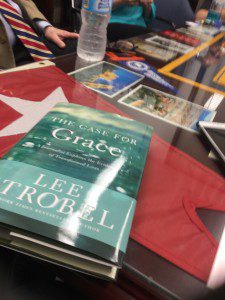The Case for Grace is the best book Lee Strobel has written and that is praising it without damning anything else he has written. Strobel is a journalist and the argument he makes in The Case for Grace is better suited to his talents than any of his other (excellent) books.
Strobel is telling readers of the transformative power of the Christian message. Yesterday I acknowledged that Christianity does not make bad men perfect, but Strobel shows that Christianity can make bad men better: much better. A person can deny reality and pretend God does not exist, but, if so, he misses out on the transformative power of grace. He ends up living off the scraps of a borrowed religious culture without any of the joy.

Lee Strobel lived that way as an atheist for years. He was plenty smart, successful, and acerbic: the very model of the new atheist before the term was minted. He was, in short, a bit of a jerk. Of course, there were reasons and hurts that made him the jerk he was, but then God came and healed the hurt and made him . . .not a jerk. Grace came and changed his life.
God adopted Lee Strobel, a truth he learned by talking to other orphans . . .physical orphans as well as spiritual ones, abandoned emotionally by distant parents. God does not abandon us. He does not condone our wickedness or the harm done to us, but still he adopts us: difficult, wayward, and broken. Perhaps the best part of the book is when Strobel confronts religious addiction: the desire to make Christianity about works, not grace.
God wants me to be holy, yet God accepted me knowing that this side of Paradise I would never be holy. The sins that concern me may not even be the sins that most concern Him at the moment. I must live by grace . . . and that means doing nothing to justify my sin (“it is just me being me”) or killing myself through religious obligations to compensate (“balance that scale”).
Strobel gets it. No atheist should leave atheism for law. Every atheist should seek grace. I should seek grace. My “works” stink. Grace is sweet. I knew at least one of the people Strobel interviewed, Craig Hazen. This I know for sure: Craig Hazen is a good man as the world counts goodness and he also has been transformed by grace. He is a better man than Hazen by himself could have been.
Hazen argues that best experience and best reason (grace and truth) make Christianity unique. We are as rational as any skeptic, loving doubt and dialectic, but as emotional as any pagan . . . seeing the handiwork of God in nature or a child. We are reasonably emotional and emotionally reasonable. And next to Hazen’s story, Strobel gives us the case of a genocidal maniac transformed by tough grace.
Strobel is not exaggerating the Case for Grace.
Apologetics is changing and in a good way. The Case for Grace is a fast read . . . a few hours at most . . . but it is a lifetime of feelings. A certain sort of rationalist dismisses the argument from religious experience too quickly. It is true that by itself it does not prove a particular religion is true, but it does suggest that Someone is there. Someone is listening. Reality says that much of the world experiences God in only a few ways: spiritualism, Islam, Hinduism, Judaism, and Christianity.
My own life has been changed by grace. Secular people would be quick to point out that much of my “goodness” is not my own. I am “good” because I am doing my duty: God wishes me to do it. Sometimes I am good out of fear of Hell fire. None of that is to my credit and anyone who does not need any of this to be good is better than I am. And yet I am confident my neighbors are glad for the restraint I show. My children are glad for the mastery of anger. Slowly over the years, much of this assumed morality has become my own. God gave me the grace to obey Him and after a few years, I actually liked being kinder and gentler.
Lee Strobel has done us a favor by capturing some great stories. Read this book in an evening after work. Reread it on a Sunday afternoon. Meditate on the Case for Grace. I am glad I read this book . . . even the discussion questions because I need grace.
Thank you, Lee Strobel.
* Bias alert: Lee Strobel is a grace filled guy. He is the sort of guy that can be approached at a conference and asked to come work at a place to “change the world” and immediately say: “I would love to do that.” He is warm, generous, and willing to see the best in a person. It is hard to relate the Strobel of the early years to the Lee Strobel who gave me a copy of this book.
So if I am biased by thinking Lee Strobel is a great guy, there you have it.











